
How come some people seem to eat whatever they like and never gain fat whereas others put on weight just thinking about dessert? Is it because they exercise more or are they just genetically blessed? Well according to overfeeding studies, some people have phenotypes that make them more prone to obesity than others. If you have no idea what a phenotype is but find nutrition to be an intriguing topic, read below. This article will teach you all about obesity resistant phenotypes and whether genetics can prevent you from putting on weight.
What Is A Phenotype?
If you took biology as a subject in high school, you will already be familiar with this term. A phenotype refers to the observable characteristics of a person such as their height, weight and eye colour (pheno means “observe”). This is different to a genotype which refers to our unseen genetic makeup. The way our bodies appear physically is the result of an interaction between our genes and the environment we live in. For example, someone could have the genes to be tall but won’t grow much if they are malnourished during childhood. The lack of nutrition in their environment makes them appear short even though they are biologically destined to be tall. As they say, “genetics load the gun and environment pulls the trigger”. If your family members have a lot of extra body fat and you grow up in an obesogenic environment where fast food is the norm then chances are, you will be overweight too. However this doesn’t mean you are doomed for life. The right nutrition and exercise regime can override your genetic predisposition to obesity. To answer the age old debate, it’s not wholly nature or nature. It’s always a combination of the two.
Obesity Resistant Phenotype
The reason some people stay lean regardless of what they eat is due to their phenotype. We know this from overfeeding studies. If you take a group of rats or people and feed them high calorie diets, some will put on a substantial amount of fat while others gain hardly any at all. These individuals who don’t put on weight have what is known as an ‘obesity resistant phenotype’. They tend to stay lean regardless of what food choices they make. Usually when someone consumes too many calories, their insulin and blood sugar levels rise and the extra energy gets stored as body fat. Those unique individuals with obesity resistant phenotypes experience a totally different metabolic response. Instead of storing the calories as fat, their bodies increase energy expenditure and use the fuel more efficiently than their obesity prone counterparts. They are less likely to develop negative health issues such cardiovascular disease and find it much easier to maintain a lean physique. Basically, they have a lot more leeway when it comes to considering the implications of their food choices because their bodies are better at oxidising fat. It’s like how a rich person doesn’t think much before spending whereas a poor person must seriously consider each financial decision. Of course everyone will gain weight if you put them in an obesogenic environment and make them consume more calories than they burn. It’s just that some people have a genetic disposition that makes them more immune to the downsides of overeating.

This Doesn’t Mean They Can Eat Anything They Want
Just because those with obesity resistant phenotypes are less likely to store fat, this doesn’t mean they can’t put on weight. It also doesn’t mean they should neglect their health and eat anything they want. Poor diet and lack of exercise contributes to a range of negative health issues including depression and cognitive decline. You might have the genes to be lean but this won’t matter if you consistently feel crappy inside. Also, just because your genetics make it difficult for you to put on weight, it doesn’t make it impossible. Excessive calorie intake and physical inactivity will lead to fat gain in any individual if they take it far enough. If you have an obesity resistant phenotype, be grateful but don’t use it to justify eating highly processed foods and sitting on your butt all day. The benefits of a good diet and movement extend to more than just body composition.

What To Do If You Are Obesity Prone
For those who were dealt the obesity prone phenotype card, fear not. It’s possible to override those genetics through environmental modifications. Obviously you will need to be more conscious of your nutrition. Keeping a food diary or tracking your calories can help you ensure you’re eating the right portion sizes. A high protein intake has also been shown to prevent overeating and help you maintain a healthy body weight. This is because protein is the most satiating macronutrient and 20-30% of the calories you consume from it get burned through the process of digestion (compared to only 5-10% for carbohydrates and 0-3% for fats). So just by prioritising protein over carbs and fats, you will be increasing your energy expenditure and less likely to put yourself into a calorie surplus. Grab yourself some protein powder and snacks and get that intake to an optimal level. Your energy in must also be balanced with energy out. Exercise is important for health, mood, fat loss and metabolism. This is especially true if you are prone to obesity. Whatever training modality you pick, be consistent. It doesn’t matter if you run, hike, lift weights, do pilates or cycle. Those with obesity prone phenotypes will benefit from moving often. Don’t rely on just diet to help you stay at a healthy body weight. You must put some effort into the output side of the equation too.
Conclusion
It’s not you, it’s your phenotype. Being thin does not negate the need to make good dietary decisions and being obesity prone doesn’t mean you can use your genetics as an excuse. Your body composition is the result of both biology and the environment you live in which is good because it means it can be altered. Regardless of your phenotype, make sure to eat the right number of calories for you, get sufficient protein and move often doing activities that you enjoy. Some people might need to put in more effort than others to stay lean but hard work pays off and you’ll be used to it in no time.
Written by Lauren Carruthers.
